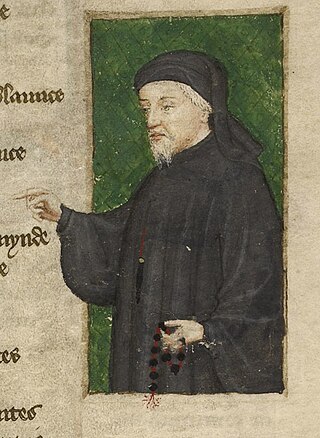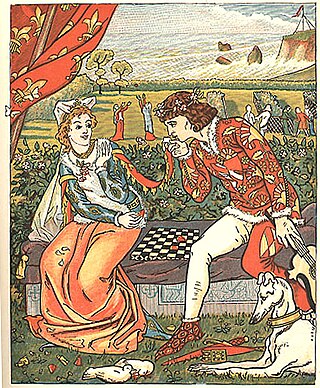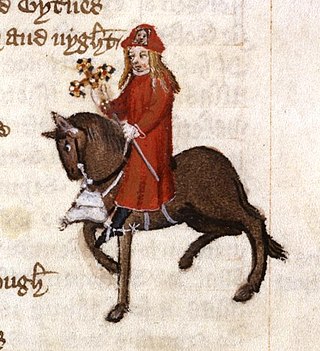
The Canterbury Tales is a collection of twenty-four stories that runs to over 17,000 lines written in Middle English by Geoffrey Chaucer between 1387 and 1400. It is widely regarded as Chaucer's magnum opus. The tales are presented as part of a story-telling contest by a group of pilgrims as they travel together from London to Canterbury to visit the shrine of Saint Thomas Becket at Canterbury Cathedral. The prize for this contest is a free meal at the Tabard Inn at Southwark on their return.

Geoffrey Chaucer was an English poet, author, and civil servant best known for The Canterbury Tales. He has been called the "father of English literature", or, alternatively, the "father of English poetry". He was the first writer to be buried in what has since come to be called Poets' Corner, in Westminster Abbey. Chaucer also gained fame as a philosopher and astronomer, composing the scientific A Treatise on the Astrolabe for his 10-year-old son, Lewis. He maintained a career in the civil service as a bureaucrat, courtier, diplomat, and member of parliament.

John Gower was an English poet, a contemporary of William Langland and the Pearl Poet, and a personal friend of Geoffrey Chaucer. He is remembered primarily for three major works—the Mirour de l'Omme, Vox Clamantis, and Confessio Amantis—three long poems written in French, Latin, and English respectively, which are united by common moral and political themes.

The Parson's Tale is the final "tale" of Geoffrey Chaucer's poetic cycle The Canterbury Tales. Unlike the other tales, it is not a narrative at all, but a treatise on penitence and the Seven Deadly Sins, a kind of spiritual "self-help" manual for personal use. Chaucer's ultimate sources are the Latin manuals of two Dominican friars, Raymund of Pennaforte and William Perault. The tale was popular with medieval and early modern audiences, but modern readers and critics have found it pedantic and boring.

"The Knight's Tale" is the first tale from Geoffrey Chaucer's The Canterbury Tales.

"The Franklin's Tale" is one of The Canterbury Tales by Geoffrey Chaucer. It focuses on issues of providence, truth, generosity and gentillesse in human relationships.

"The Pardoner's Tale" is one of The Canterbury Tales by Geoffrey Chaucer. In the order of the Tales, it comes after The Physician's Tale and before The Shipman's Tale; it is prompted by the Host's desire to hear something positive after the physician's depressing tale. The Pardoner initiates his Prologue—briefly accounting his methods of swindling people—and then proceeds to tell a moral tale.

"The Man of Law's Tale" is the fifth of the Canterbury Tales by Geoffrey Chaucer, written around 1387. John Gower's "Tale of Constance" in Confessio Amantis tells the same story and may have been a source for Chaucer. Nicholas Trivet's Les chronicles was a source for both authors.
"Sir Thopas" is one of The Canterbury Tales by Geoffrey Chaucer, published in 1387. The tale is one of two—together with The Tale of Melibee—told by the fictive Geoffrey Chaucer as he travels with the pilgrims on the journey to Canterbury Cathedral. The tale concerns the adventures of the knight Sir Thopas and his quest to win the elf-queen.

The General Prologue is the first part of The Canterbury Tales by Geoffrey Chaucer. It introduces the frame story, in which a group of pilgrims travelling to the shrine of Thomas Becket in Canterbury agree to take part in a storytelling competition, and describes the pilgrims themselves. The Prologue is arguably the most familiar section of The Canterbury Tales, depicting traffic between places, languages and cultures, as well as introducing and describing the pilgrims who will narrate the tales.

"The Prioress's Tale" is one of The Canterbury Tales by Geoffrey Chaucer.

"The Physician's Tale" is one of The Canterbury Tales, written by Geoffrey Chaucer in the 14th century.
The Tale of Melibee is one of The Canterbury Tales by Geoffrey Chaucer.

The Canterbury Tales is a 1972 medieval erotic black comedy Italian film directed by Pier Paolo Pasolini based on the medieval narrative poem by Geoffrey Chaucer. The second film in Pasolini's "Trilogy of Life", preceded by The Decameron and followed by Arabian Nights, it won the Golden Bear at the 22nd Berlin International Film Festival.

Canterbury Tales is a series of six single dramas that originally aired on BBC One in 2003. Each story is an adaptation of one of Geoffrey Chaucer's 14th-century Canterbury Tales. While the stories have been transferred to a modern, 21st-century setting, they are still set along the traditional Pilgrims' route to Canterbury.

Contact between Geoffrey Chaucer and the Italian humanists Petrarch or Boccaccio has been proposed by scholars for centuries. More recent scholarship tends to discount these earlier speculations because of lack of evidence. As Leonard Koff remarks, the story of their meeting is "a 'tydying' worthy of Chaucer himself".
The Prologue and Tale of Beryn are spurious fifteenth century additions to Geoffrey Chaucer's Canterbury Tales. They are both written in Middle English.
The Canterbury Tales is a collection of stories, mostly in verse, written by Geoffrey Chaucer chiefly from 1387 to 1400. They are held together in a frame story of a pilgrimage on which each member of the group is to tell two tales on the way to Canterbury, and two on the way back. Fewer than a quarter of the projected tales were completed before Chaucer's death. It is uncertain in what order Chaucer intended the tales to appear; moreover it is very possible that, as a work-in-progress, no final authorial order of tales ever existed.

The Squire is a fictional character in the framing narrative of Geoffrey Chaucer's Canterbury Tales. He is squire to the Knight and is the narrator of The Squire's Tale or Cambuscan. The Squire is one of the secular pilgrims, of the military group. The Knight and the Squire are the pilgrims with the highest social status. However his tale, interrupted as it is, is paired with that of the Franklin. The Squire is a candidate for the interrupter of The Host in the epilogue of the Man of Law's Tale.
Marion Turner is the J. R. R. Tolkien Professor of English Literature and Language at the University of Oxford and an academic authority on Geoffrey Chaucer. She has authored several books, including Chaucer: A European Life, which was shortlisted in 2020 for the Wolfson History Prize, and was a finalist in the PROSE Awards, and for which she was awarded the 2020 Rose Mary Crawshay Prize.















